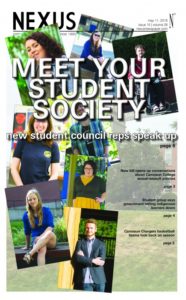There was a passionate critique of the Women’s Lounge—a student-run space on Camosun College’s Lansdowne campus—in a recent Open Space in Nexus (“Camosun’s Women’s Collective needs to rethink approach,” March 16, 2016 issue). Although a positive intention can certainly be assumed on the part of the author, the opinions outlined are an inaccurate portrayal of the actual function of this space.
Despite the opinion piece not being particularly positive in scope in its analysis of the Women’s Lounge and its perceived function, it should be noted that feminist activism, or lack thereof, on campus is an incredibly important conversation to maintain. There is immense value in actively pushing toward being more effective in addressing oppression of any kind.
The Women’s Lounge was referred to as a “female-friendly space,” stating that it is only open to women. Not only does this statement conflate sex with gender, but it does not reflect current practice. The Women’s Lounge is maintained as a safer space that is open to all, although self-identified women are prioritized, and it’s often where the Women’s Collective meets to discuss events we’d like to hold, advocacy we’d like to engage in, and how we feel is best to maintain the lounge. There are individuals who use it as a quieter space on campus that tends to contain fewer self-identified men, and that is incredibly reasonable given that gender inequality doesn’t cease to exist when one arrives on campus grounds.

It is particularly important that the function of the Women’s Lounge be clarified. The opinion piece in question highlighted the absence of direct support the Women’s Lounge offers to survivors of sexual assault. The Women’s Lounge is in no way a crisis centre, nor has it ever been intended to act as such. The lounge is a comfortable space to unwind, study, and work together. This space also acts as a point of contact where students can learn about resources and support both on and off campus.
Feedback collected anonymously from students who utilize this space did contain some agreement with the points made, although the vast majority of those who offered feedback did not agree with what was being suggested. Themes included the importance of maintaining safer spaces, as well as alarm that space for self-identified women was being challenged—particularly when there are similar spaces on campus for indigenous students and queer students—and concern that perhaps the value of these spaces was being challenged as well.
It was also noted repeatedly that the criticism of this piece—all based in issues rooted in a patriarchal society—appeared to be assigned as the responsibility of self-identified women. The overall tone of feedback was that of frustration with the portrayal of the Women’s Lounge.
These are important conversations. There is always room to take student-based initiatives in new directions. If you have any feedback or questions, or would like to get involved, please contact the Camosun College Student Society’s Women’s Director at womens@camosunstudent.org.
